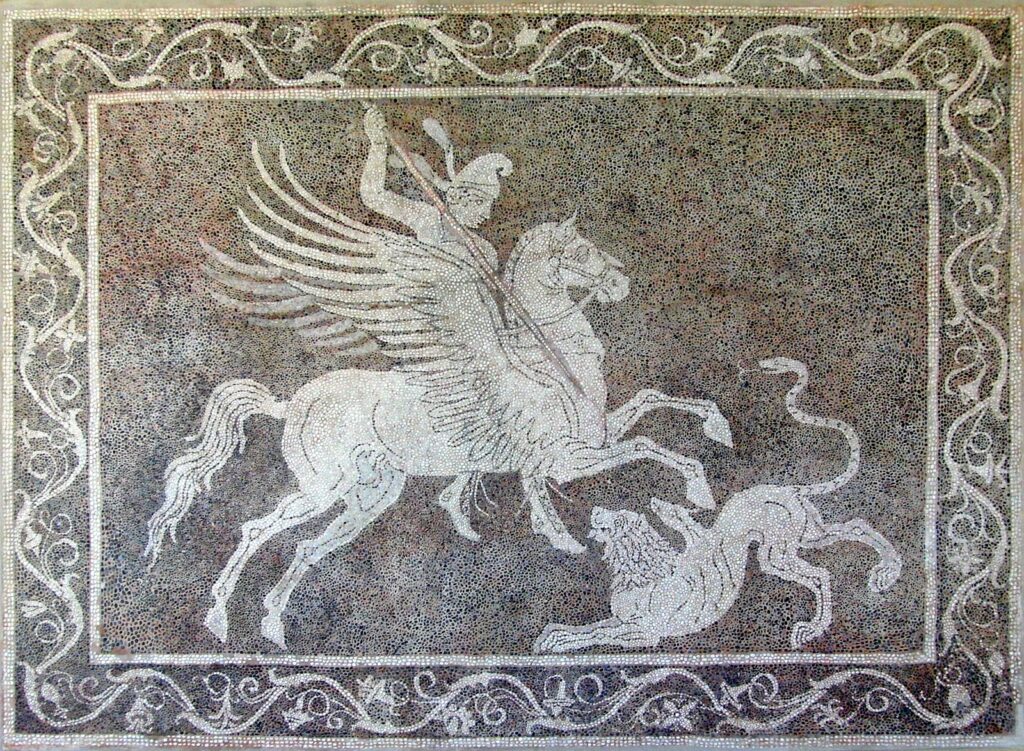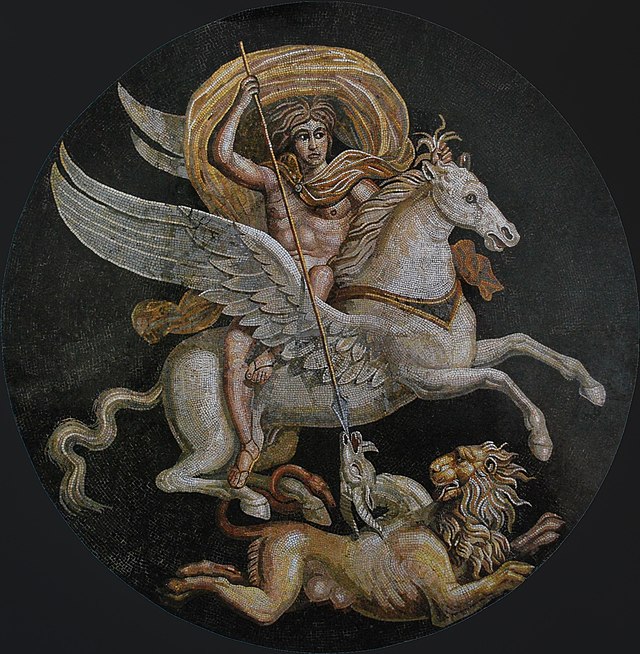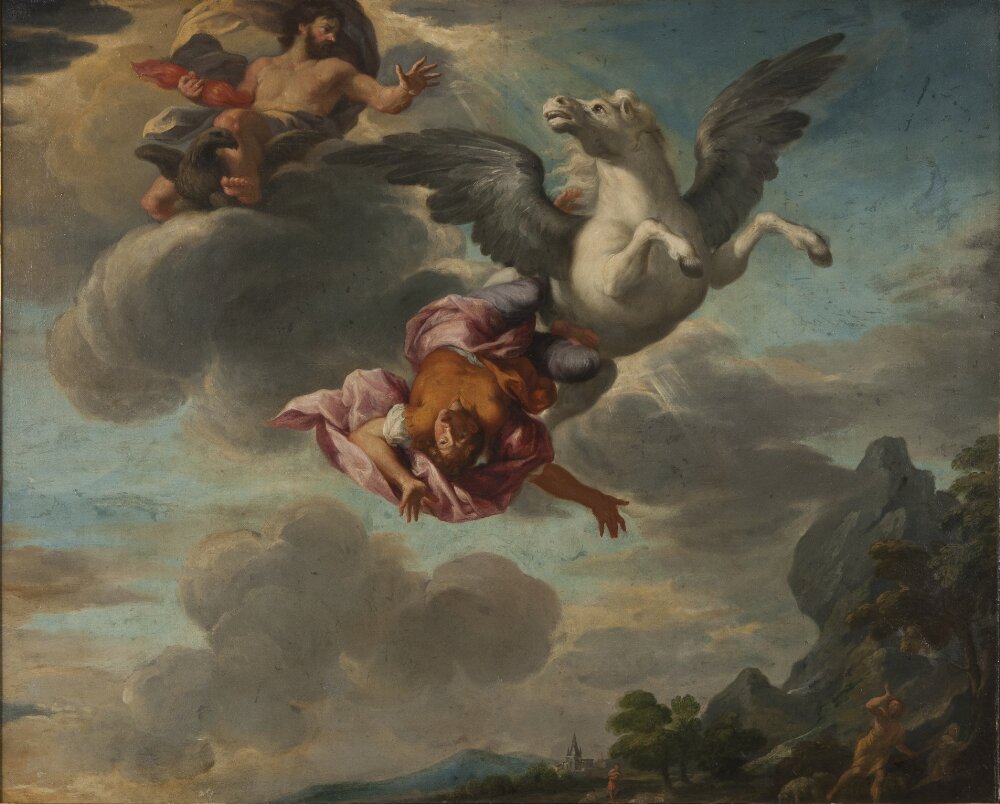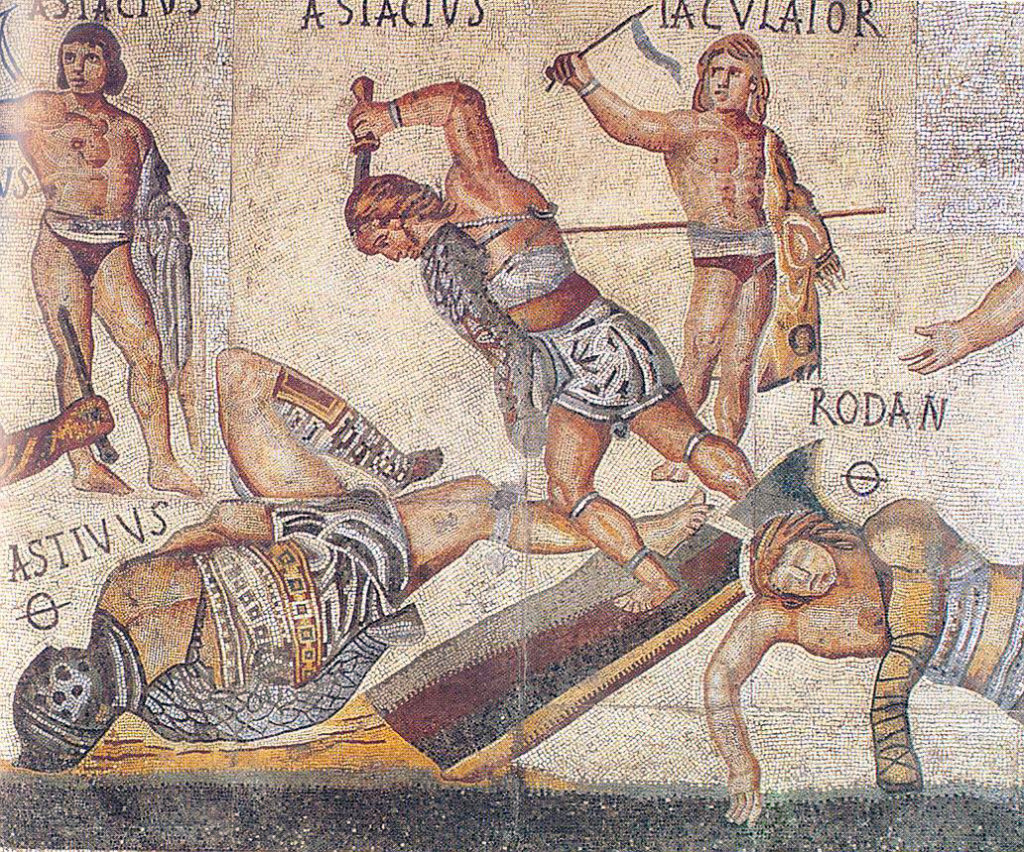Bellerophon, whose original name was Hipponous, is a mythical Greek character. He became a great hero, equivalent to Hercules or Perseus.
He was born of Poseidon and Eurymone, the daughter of the King of Megara. Eurymone also married King Glaukos, son of Sisyphus.
This ties Bellerophon to another major character of Greek mythology. Sisyphus was cursed by Hades for avoiding death twice and was forced to push a boulder up a hill for eternity.

Origins of Bellerophon
The name Bellerophon has two competing origins. One is that the etymological roots of the name could be related to the Greek word for projectile. This would relate to a number of Bellerphon’s feats throughout his life.
The other interpretation is derived from the Scholia of Homer. It dictates that Hipponous accidentally killed someone named Belleros in Corinth while practicing knife-throwing. This narrative description explains the rest of Bellerophon’s tale as he changed his name to mean “killer of Belleros.”
He was later exiled from Corinth, although some tales claim he killed his brother.
Bellerophon’s First Exile
In his exile, Bellerophon sought atonement from King Proetus. He granted it to him and welcomed him with open arms.
Shortly after, however, the king’s wife began to lust after Bellerophon who rejected her advances. Insulted, she told Proetus that Bellerophon had tried to make advances on her.
But Bellerophon was protected by the Greek concept of xenia: extending hospitality to strangers. Rather than risk transgressing the societal contract defining hospitality, Proetus decided to get rid of his issue in a different way.
Iobates’ Dilemma
Proetus wrote a letter and placed it in a sealed tablet. He then gave it to Bellerophon as he exiled him to Lycia.
The king of Lycia was Iobates, Proetus’ father-in-law. The letter was asking him to kill Bellerophon for attempting to violate his daughter. However, when Bellerophon arrived in Lycia he was accepted with open arms.
The two feasted for over a week together before Iobates read the letter from Proetus. After accepting Bellerophon as a guest under xenia, Iobates was subject to the same hesitance that Proetus faced. Therefore, he had to find an alternate way to get rid of Bellerophon.
Taming Pegasus and Defeating the Chimera
King Iobates decided that if he could not kill Bellerophon himself, he would instead task him with a quest that was nearly impossible to survive.
In the nearby state of Caria, there was a chimera terrorizing the countryside. In the Iliad, Homer describes the chimera as a beast with the head of a lion, the body of a goat, and the tail of a serpent that could breathe fire.
Bellerophon prepared himself and set out to defeat the beast. On the way, he encountered the Corinthian fortune teller Polyeidos. The fortune informed Bellerophon that he would need the assistance of the mythical creature, Pegasus, in order to defeat the chimera.
It also informed him that he must sleep in the temple of Athena for guidance on how to tame Pegasus. As Bellerophon slept, Athena approached him in a dream and left a golden saddle next to him with instructions to approach Pegasus as it drank from a fountain in his home city.
Other versions of the tale assert that Athena or Poseidon, who was the god of horses, brought Pegasus to Bellerophon already tamed. Regardless, after taming Pegasus, the pair returned to Lycia to defeat the chimera.

The creature’s fiery breath kept Bellerophon from easily defeating it until he had the idea of strapping a block of lead to his spear tip. With his newly constructed weapon, he waited until the chimera opened its mouth again and swept in, shoving the lead into its throat.
As the chimera attempted to breathe fire it melted the block which blocked its airway, killing the beast.
Other Great Feats
Bellerophon returned to Iobates who was astonished that he had succeeded without being killed. In a second attempt to rid himself of Bellerophon, he dispatched him to defeat the Solymi tribe, who were historical adversaries of Iobates.
After easily defeating them, Iobates then sent him to fight the Amazons. He defeated them by dropping boulders on them whilst riding Pegasus.
Iobates then attempted to send his armies after Bellerophon. But he defeated everyone sent to kill him with help from his father Poseidon.
After this, Iobates relinquished his anger and accepted that Bellerophon had the favor of the gods. He offered Bellerophon half of his kingdom and his daughter’s hand in marriage. But this only satisfied Bellerophon for a short time.
Bellerophon’s Fall
After his series of mythical accomplishments, Bellerophon’s hubris, or fatal pride, was so powerful that he mounted Pegasus and attempted to fly to Mount Olympus to see the gods himself. Zeus was angered by this attempt and sent a gadfly to sting Pegasus.
The horse bucked Bellerophon and he plummeted back to earth. Some accounts claimed he died in the fall. Others claimed he was blinded when he fell into a thorn bush.
The latter tale ends with Bellerophon blindly wandering the earth in a miserable state, depressed at his literal and metaphorical fall. He eventually died of his grief.

The tale of Bellerophon is a classical Greek tragedy. A young hero achieves great accomplishments before ultimately becoming too prideful and falling prey to his pride.
Hubris consumed many great Greek characters, such as Oedipus and Icarus. Bellerophon made similar mistakes in believing his own greatness places him on a similar footing as the gods.
Bellerophon was no different. Being born of Poseidon and having tamed Pegasus, it was easy to believe he was above mortal men. But the gods prefer those who respect their power. This is why heroes such as Perseus and Hercules are more widely celebrated.
References
Shaw, Charles D. “BELLEROPHON AND THE CHIMERA: Adapted from Stories of the Ancient Greeks.” Pressbooks, 2018. https://pressbooks.pub/iagtm/chapter/story-bellerophon/.
“Bellerophon.” GreekMythology.com, April 14, 2021. https://www.greekmythology.com/Myths/Heroes/Bellerophon/bellerophon.html.

